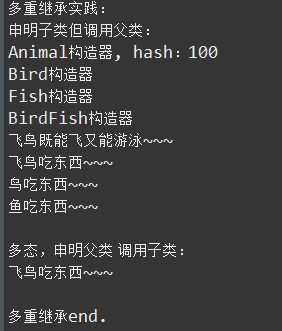实践代码如下:
#include <iostream> using namespace std; class Animal { private: int hash; public: Animal() { hash = 100; cout << "Animal构造器, hash:" << hash << endl; } virtual ~Animal() { } int getHash() { return hash; } }; class Bird: virtual public Animal { public: Bird() { cout << "Bird构造器" << endl; } void fly() { cout << "鸟在天上飞~~~" << endl; } void eat() { cout << "鸟吃东西~~~" << endl; } }; class Fish: public virtual Animal { public: Fish() { cout << "Fish构造器" << endl; } virtual ~Fish(){ } void fly() { cout << "鱼在水里游~~~" << endl; } virtual void eat() { cout << "鱼吃东西~~~" << endl; } }; // 构造器由继承顺序从左往右初始化 // #No1. 多继承时,子类都继承animal基类,此时animal构造器会调用多次, java C#等单继承也是设计者充分考虑这个问题 class BirdFish: public Bird, public Fish { public: BirdFish() { cout << "BirdFish构造器" << endl; } // #No2.若没有下面eat方法,两个子类都有eat方法,当调用BirdFish.eat时会报: eat is ambiguous: 模棱两可的 candidates: 候选人 here, 编译不通过,提示二义性 // 若只有一个子类有eat方法则不会报错 void eat() { cout << "飞鸟吃东西~~~" << endl; } void action() { cout << "飞鸟既能飞又能游泳~~~" << endl; } }; int main() { cout << "多重继承实践:" << endl; cout << "申明子类但调用父类:" << endl; BirdFish bf; bf.action(); bf.eat(); bf.Bird::eat(); bf.Fish::eat(); cout << "\n多态,申明父类 调用子类:" << endl; Fish *fish = &bf; // #No3.若父类的方法不申明为virtual, 则调用不到子类方法 fish->eat(); cout << "\n多重继承end." << endl; return 0; }
输出:

总结:
#No1. 多继承时,子类都继承animal基类,此时animal构造器会调用多次, java C#等单继承也是设计者充分考虑这个问题
#No2.若没有下面eat方法,两个子类都有eat方法,当调用BirdFish.eat时会报: eat is ambiguous: 模棱两可的 candidates: 候选人 here, 编译不通过,提示二义性
若只有一个子类有eat方法则不会报错
#No3.若父类的方法不申明为virtual, 则调用不到子类方法




【推荐】编程新体验,更懂你的AI,立即体验豆包MarsCode编程助手
【推荐】凌霞软件回馈社区,博客园 & 1Panel & Halo 联合会员上线
【推荐】抖音旗下AI助手豆包,你的智能百科全书,全免费不限次数
【推荐】博客园社区专享云产品让利特惠,阿里云新客6.5折上折
【推荐】轻量又高性能的 SSH 工具 IShell:AI 加持,快人一步